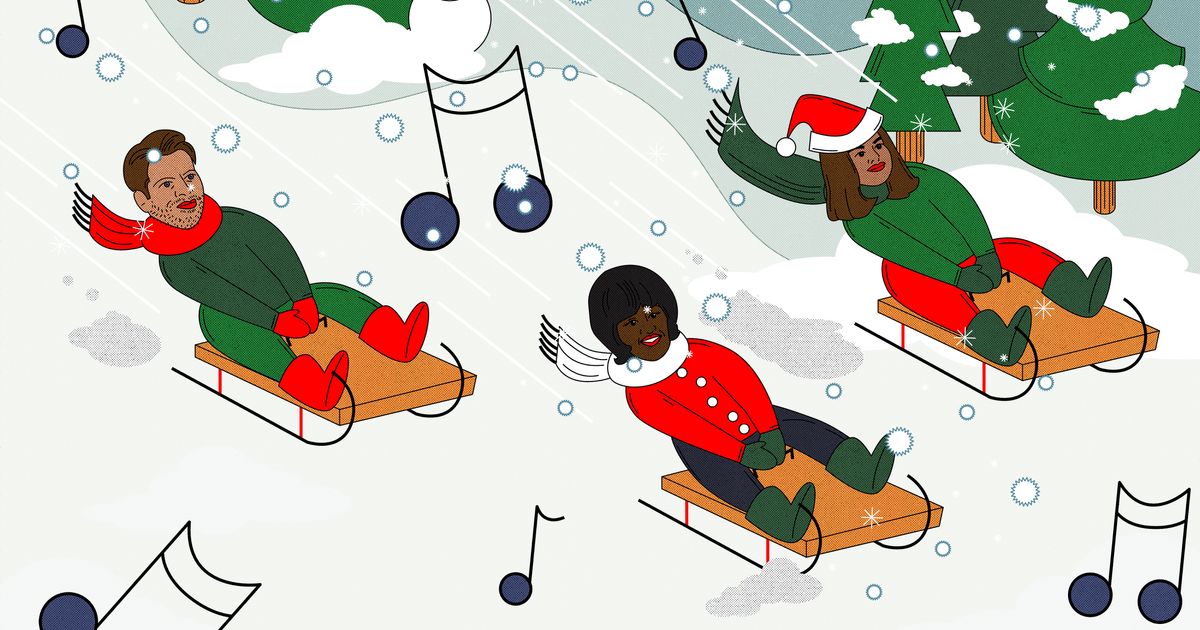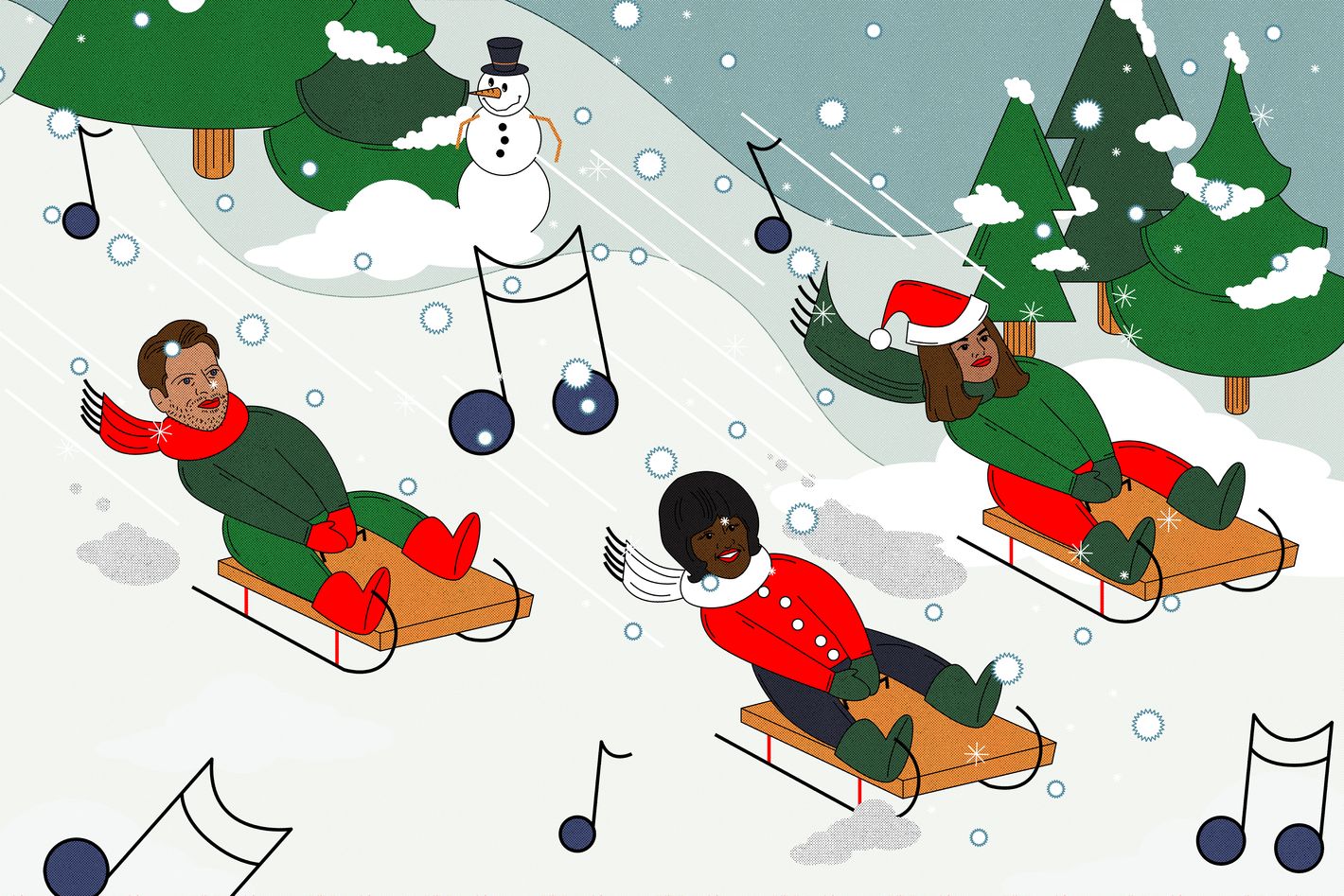The 10 Best Versions of ‘Winter Wonderland’
The idiosyncratic yet charming classic that everyone from Ella Fitzgerald to Selena Gomez can agree on.


This list originally ran on December 3, 2022. We’re republishing it in honor of the season.
Listen to enough versions of “Winter Wonderland” — say, more than 150 — and it’s hard not to start picking up on the fact that lyrically speaking, it’s a bit of an odd duck as holiday songs go. The first two choruses basically boil down to “Hey, it snowed, and also birds are nice,” right before a bridge where a snow golem is imbued with religious authority. And even disregarding the way that our heroes specifically and unsettlingly “conspire” and “face unafraid the plans” — two very normal holiday activities — the indoor canoodling by the fireside in the third chorus is the precise opposite of walking in a winter wonderland. Things don’t much improve in the rewritten kid-friendly version that celebrates clown-punching and includes a word that’s increasingly understood to be offensive.
But such is the good nature of “Winter Wonderland” that, except for that last bit, none of it works to undercut the song; if anything, it adds idiosyncratic charm. Since its 1934 debut, when Richard Himber’s orchestra banged out the first recording as a one-take Hail Mary at the end of a session at the urging of vocalist Joey Nash, it’s proven itself malleable enough to adapt to any number of genres (rockabilly, R&B, country, jazz, shoegaze, gospel, and heavy metal, among them) and sturdy enough to maintain its appeal even when roughly 80% of all versions fundamentally stick to some variation on the same big band arrangement. Insert the singer of your choice and it’s hard to go wrong. Here are ten that stand out in a worthy crowd.
Alexander O’Neal (1988)
There are plenty of swing versions of “Wonderland” to be found, but few are as jumped-up as O’Neal’s. The jazz orchestra sounds like it’s constantly straining to hold itself back, with horn flips that blast out excitedly and a bass that seems like it’s stopping itself from tiptoeing ahead of the rest of the band. Right on top is O’Neal, riding that pulse-racing groove by alternately swerving and stepping on the acceleration. The simmering midsection is a fake-out, the singer murmuring “Got me walkin’” right before the song bursts back to life and everyone takes off like a shot once more.
Harry Connick, Jr. (1989)
Connick took a lot of guff for being a Frank Sinatra knockoff at the time When Harry Met Sally… came out, and it must have taken tremendous personal strength for him not to scream at the top of his lungs for people to actually listen to the soundtrack that they just bought two million copies of. In addition to his jazz-trio take on big-band standard “Stompin’ At The Savoy,” Connick transformed “Wonderland” into a rip-roaring New Orleans instrumental, with the musician alone at his piano taking a cold-weather song to a city where it hardly ever drops below freezing.
The Roches (1990)
With apologies to Take 6, Pentatonix, and Manhattan Transfer: The Roches’ Noo Joisey-accented “Wonderland” is the a cappella version to beat. Not that those others don’t have their charms (the precision and rhythmic playfulness of Take 6 is a particular winner), but Maggie, Terre, and Suzzy have a vision for the song, and it goes well beyond “blueboid”; the cracked harmonies turn the vocals inside out, taking the song places it rarely goes but remaining gorgeous every step of the way nonetheless.
Selena Gomez & The Scene (2009)
For reasons unknown, genuinely electric versions of “Wonderland” are few and far between, with rockers typically opting for either Spectorian pop grandeur or jazzy swing. With apologies to Christian metal band Stryper, whose shaggy cover is warm and spirited enough to gloss over the fact that it’s kind of a mess, it’s Gomez’s version that takes the crown for folks looking for some six-string distortion in their conspiring. Recorded with her band the Scene — from the days when she had a band called the Scene — this is candy-coated glam, with sharp guitars slashing through the snowfall.
Tommy Emmanuel and Annie Sellick (2016)
Even if you accept that the original intentions of “Baby It’s Cold Outside” were sly and consensually sexy rather than assault-adjacent, its use of language that’s indistinguishable from that of coercion makes it more radioactive with each passing year. So what is a person who wants a flirty Christmas back-and-forth to do? Cue up this jazzy acoustic “Wonderland,” which divvies the lyrics up between Sellick and Emmanuel and takes care of the problem so thoroughly that you won’t even notice that “Baby” isn’t on the playlist.
Doris Day (1964)
Most “Wonderland”s are happy jaunts, implicitly or explicitly focusing on the innocent pleasure of traipsing through a landscape of new-fallen snow. Day’s version, on the other hand, is slow and languid, bypassing the song’s inherent swing in favor of a lush swoon. Starting with the less common verse that explicitly positions the song as one for lovers with a world of possibility open to them, Day sings with a soft, elongated phrasing, resulting in maybe the rendition with the most unabashed sexuality rippling through it, shifting the song’s center of gravity towards that third chorus. That’s the one where plans are made by the fire.
Darlene Love (1963)
Try as you might, Love’s holiday gravity is simply too strong to resist. Some singers like Leona Lewis don’t even bother, copying the arrangement by convicted murderer Phil Spector, right down to the custom-made plinky-chime fanfare that swoops into the song proper. As both a solo artist and a member of Bob B. Soxx & The Blue Jeans, Love appears on more than half the songs on Spector’s A Christmas Gift For You, and it’s hard to argue with her omnipresence. Given a backdrop that fills the air with depth and momentum, Love does what she does best, which is sing the everloving bejeezus out of it, sparkling the whole time.
Fleming And John (1997)
If you’re going to follow through on a goofy idea, the last thing you should do is half-ass it. And let’s be clear: The idea of grafting the lyrics to “Winter Wonderland” to the heady, hobbit-fueled stomp of Led Zeppelin’s “Misty Mountain Hop” is putting a goofy hat atop a goofy hat. But Fleming And John play their unholy hybrid with absolute conviction, the drums thundering and guitars lurching as Fleming McWilliams howls out her best Robert Plant. It charges fleetly across the land of the ice and snow, belonging in the upper echelon of superlative Zeppelin covers. Then the horsey clip-clops come.
Ella Fitzgerald (1960)
The best traditional version of “Winter Wonderland,” perhaps obviously. Who’s going to beat Ella? But this isn’t a matter of Fitzgerald taking the trophy just by showing up. She comes by her victory honestly, outdoing the likes of Armstrong, Crosby, Martin, Como, Bennett and the Andrews Sisters, all of whom bring their A games. Fitzgerald puts on a masterclass, delivering the melody as written with authority and then dipping out to embellish her vocal line just enough to be surprising, at just the right moments to be surprising. An unvarnished delight.
Garrett Morris and the cast of Saturday Night Live (1975)
Unlike SNL holiday perennials “Christmastime For the Jews” or “Santa’s My Boyfriend,” there’s no punchline. Unlike “I Wish It Was Christmas Today,” it’s not played for dorky enthusiasm. It is, simply, pure joy, with no further agenda. With Laraine Newman, Jane Curtin, Gilda Radner, and Candice Bergen assisting on the women’s side and Chevy Chase, Dan Aykroyd and John Belushi on the men’s side, Morris sings his heart out in front of a good-time R&B band decked out like Christmas tree angels, with Lou Marini’s giant honking baritone sax taking a stroll. It’s the holiday spirit made manifest.
Related








